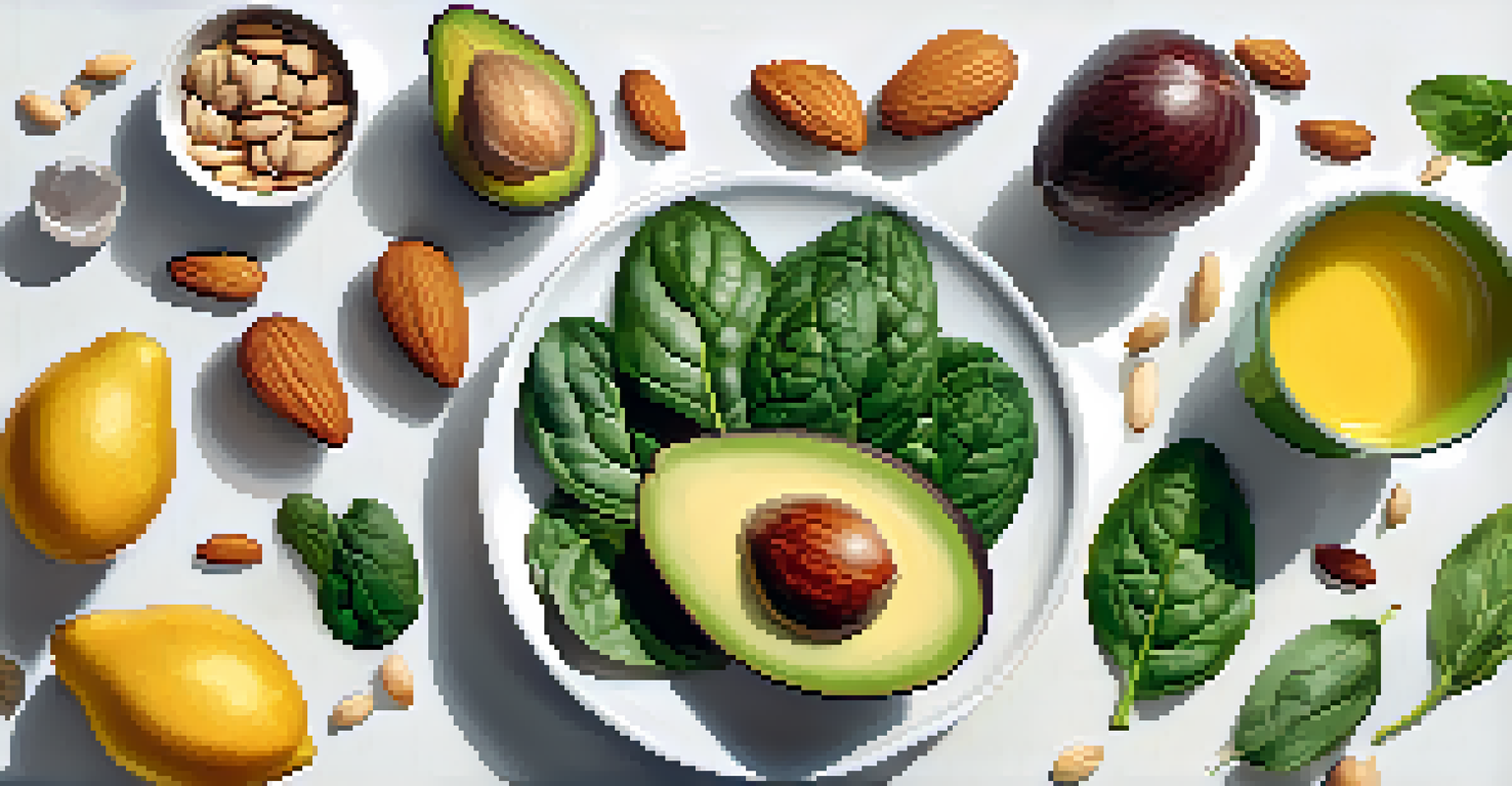Vitamin E: Its Benefits for Skin Health and Antioxidant Role

Understanding Vitamin E and Its Importance
Vitamin E is a fat-soluble nutrient that plays a crucial role in our overall health. It's primarily known for its antioxidant properties, which help combat free radicals in the body. These free radicals can cause oxidative stress, leading to various health issues, including skin problems.
Vitamin E is a powerful antioxidant that helps combat free radicals and supports skin health.
This vitamin isn't just a single entity; it comprises a group of compounds, the most notable being tocopherols and tocotrienols. Each of these compounds contributes uniquely to health, particularly skin health. By understanding the different forms of Vitamin E, we can appreciate its diverse benefits.
Incorporating Vitamin E into your diet or skincare routine can yield impressive results. From almond oil to avocados, many foods are rich in this essential nutrient, making it easier than ever to ensure you're getting enough.
The Role of Vitamin E in Skin Health
Vitamin E is often hailed as a skin superhero, and for good reason! It helps maintain skin elasticity and moisture, which are vital for a youthful appearance. This nutrient works by forming a protective barrier on the skin, preventing moisture loss and keeping it hydrated.

Moreover, Vitamin E has anti-inflammatory properties that can soothe irritated skin, making it beneficial for conditions like eczema or psoriasis. This soothing effect can help reduce redness and promote an even skin tone, enhancing overall skin health.
Vitamin E: A Skin Health Booster
Vitamin E is essential for maintaining skin elasticity and moisture, protecting against damage and promoting a youthful appearance.
Using skincare products enriched with Vitamin E can also promote healing. Whether it's reducing the appearance of scars or soothing sunburn, this vitamin supports your skin's natural repair processes, leading to healthier, more resilient skin.
Antioxidant Properties of Vitamin E Explained
At its core, Vitamin E is a powerful antioxidant, meaning it helps protect our cells from damage caused by free radicals. These unstable molecules can accelerate aging and contribute to various diseases, so having a reliable defense is essential. Vitamin E neutralizes free radicals, thus safeguarding our skin and overall health.
The skin is a reflection of the body's overall health, and Vitamin E plays a vital role in maintaining its youthful appearance.
The antioxidant action of Vitamin E is particularly beneficial in skincare. It can help mitigate the damage from UV rays and environmental pollutants, which often lead to premature aging. By incorporating Vitamin E into your routine, you create an extra layer of defense against these external aggressors.
In addition to its protective effects, Vitamin E can enhance the effectiveness of other antioxidants. When combined with Vitamin C, for example, these nutrients work synergistically to enhance each other's benefits, providing even greater protection for your skin.
Sources of Vitamin E: Foods and Supplements
To reap the benefits of Vitamin E, incorporating it into your diet is key. Foods rich in this nutrient include nuts, seeds, spinach, and avocado, making it easy to include in everyday meals. Snacking on almonds or adding spinach to your salads can significantly boost your intake.
For those who may struggle to get enough Vitamin E through diet alone, supplements are an option. However, it's essential to consult with a healthcare professional before starting any new supplement regimen. They can help determine the right dosage and form for your individual needs.
Antioxidant Power of Vitamin E
As a potent antioxidant, Vitamin E neutralizes free radicals, helping to protect skin from aging and environmental stressors.
Keep in mind that a balanced diet is the best approach. While supplements can help, whole food sources provide a range of nutrients that work together to enhance your health. Prioritizing a diverse diet will not only boost your Vitamin E levels but also support your overall well-being.
Vitamin E and Skin Aging: Fighting the Signs
As we age, our skin naturally loses elasticity and moisture, leading to wrinkles and fine lines. Vitamin E can play a pivotal role in combating these signs of aging by enhancing skin hydration and elasticity. This nutrient helps keep the skin plump and youthful, working to reduce the appearance of aging.
In addition to hydration, Vitamin E’s antioxidant properties help protect against environmental damage, which can exacerbate aging. By neutralizing free radicals, Vitamin E helps preserve skin's youthful appearance, making it a valuable addition to any anti-aging skincare routine.
Many skincare products now boast Vitamin E in their formulations specifically for its anti-aging benefits. From serums to moisturizers, these products can help restore a youthful glow and fight off the visible signs of aging.
How to Incorporate Vitamin E in Your Skincare Routine
Adding Vitamin E to your skincare routine can be straightforward and effective. Look for products that list Vitamin E high on their ingredient list, such as oils, creams, or serums. Applying these products regularly can help maximize the benefits for your skin.
You can also use pure Vitamin E oil as a treatment for specific areas. For instance, applying it directly to scars or dry patches can enhance healing and hydration. Just a few drops can make a significant difference in skin texture and appearance.
Incorporating Vitamin E Easily
You can easily incorporate Vitamin E into your diet through foods like nuts and avocados or through skincare products for enhanced benefits.
Don’t forget about the importance of layering. Pairing Vitamin E with other skincare ingredients, like hyaluronic acid or retinol, can boost its effectiveness. This combination can provide deep hydration while also promoting cell turnover for smoother, healthier skin.
Potential Side Effects and Considerations
While Vitamin E is generally safe for most people, some may experience allergic reactions or skin irritation, particularly when using concentrated forms. It's always wise to conduct a patch test before trying new products. This simple step can help you avoid unwanted reactions.
For those considering supplements, moderation is key. Excessive intake of Vitamin E can lead to adverse effects, such as increased bleeding risk. Therefore, sticking to recommended daily values is crucial for safety.

As with any health or skincare decision, consulting with a healthcare professional is advisable. They can guide you based on your specific needs, ensuring you reap the benefits of Vitamin E without any negative effects.